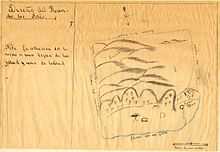Rancho Los Feliz
Rancho Los Feliz was a 6,647-acre (26.90 km2) Spanish land concession in present day Los Angeles County, California given in 1795 by Spanish Governor Pedro Fages to Jose Vicente Feliz. The land of the grant includes Los Feliz and Griffith Park, and was bounded on the east by the Los Angeles River.[1][2]
History
Given to Jose Vicente Feliz, this was one of the first land grants made in California. Feliz (or Felix) was born in Sonora, Mexico, about 1741. Corporal Feliz, a veteran of the Anza Expedition of 1776, was a guard at the Pueblo of Los Angeles.[3] In 1787 Governor Fages appointed Feliz as Comisionado of the Los Angeles Pueblo, giving him the powers of Mayor and Judge. For his service, Feliz was granted Rancho Los Feliz.[4]
The grant was confirmed in 1843 by Mexican Governor Manuel Micheltorena to Maria Ygnacia Verdugo de Feliz.[5] Maria Ygnacia Feliz was the wife of one of the sons of Jose Vicente Feliz. When Maria's husband died, she inherited the rancho, and later married Juan Diego Verdugo.[6]

With the cession of California to the United States following the Mexican-American War, the 1848 Treaty of Guadalupe Hidalgo provided that the land grants would be honored. As required by the Land Act of 1851, a claim for Rancho Los Feliz was filed with the Public Land Commission in 1852,[7] and the grant was patented to Maria Ygnacia Verdugo de Feliz in 1871.[8]
In 1863, lawyer Antonio F. Coronel acquired ownership of Rancho Los Feliz from the heirs of Maria Ygnacia Verdugo de Feliz. Coronel sold Rancho Los Feliz to James Lick, a wealthy businessman from San Francisco. Lick died in 1876.
In 1882, Colonel Griffith Jenkins Griffith acquired 4,071 acres (16.5 km2) of Rancho Los Feliz. Colonel Griffith donated to the city of Los Angeles 3,015 acres (12.2 km2) (nearly half of the original rancho), which became Griffith Park, one of the largest city-owned parks in the country. At the time, the Lick estate still owned the southwest portion of the rancho, and there developed the Lick Tract, which later became a part of Hollywood.
Historic sites of the Rancho
- Los Feliz Adobe. An old adobe house built in the 1830s by heirs of Feliz still stands in Griffith Park (Park Ranger's Headquarters).[9][10]
- Maugna, site of former Native American Tongva ranchería settlement preceding the Mexican rancho.
References
- ↑ U.S. Geological Survey Geographic Names Information System: Rancho Los Feliz
- ↑ Map of old Spanish and Mexican ranchos in Los Angeles County
- ↑ Los Pobladores
- ↑ John Schmal & Jennifer Vo, 2004,A Mexican-American Family of California: In the Service of Three Flags, Heritage Books,ISBN 978-0-7884-2448-9
- ↑ Ogden Hoffman, 1862, Reports of Land Cases Determined in the United States District Court for the Northern District of California, Numa Hubert, San Francisco
- ↑ Rancho Los Feliz: An Anza Expedition Legacy
- ↑ United States. District Court (California : Southern District) Land Case 133 SD
- ↑ Report of the Surveyor General 1844 - 1886
- ↑ Hoover, Mildred B.; Hero & Ethel Rensch, and William N. Abeloe (1966). Historic Spots in California. Stanford University Press. ISBN 978-0-8047-4482-9.
- ↑ Rancho Los Feliz
See also
External links
Coordinates: 34°07′12″N 118°18′00″W / 34.120°N 118.300°W
| ||||||||||||||||||||||